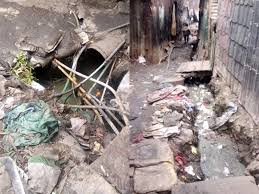Mathare, one of Nairobi’s most densely populated informal settlements, is facing severe sanitation issues that are crippling local businesses and posing significant health risks to locals.
Open-air eateries, which are vital to the community’s economy and daily life, are particularly affected by the poor drainage system and blocked sewer lines.
For instance, unwelcoming stench coming from a nearby raw sewer line scares away potential customers of Abdallah Ramadan who operates a small mandazi business in Mathare.
Food businesses in Mathare have been hit hard by the evidently blocked sewer lines.
“The stagnant, contaminated water makes the environment unsanitary, driving away customers and leading to a significant drop in income for these small business owners,” Ramadan tells Citizen Digital.
The smell alone is enough to deter anyone from dining in the area, not to mention the health concerns associated with consuming food in such conditions.
“No buyer will develop interest in your mandazi when an open sewer line passes at your place of work. Hygiene is key in any business establishment,” he said.
These eateries, which are essential to Mathare’s local economy, provide affordable meals to residents and employment to many.
With the ongoing sanitation crisis, the livelihoods of the business owners are now threatened.
Looking around the area, it is hard to identify decent public sanitation facilities.
The blocked sewer lines and the resulting poor drainage have severe health implications for Mathare’s residents.
The use of ‘flying toilets’ – plastic bags used for defecation and then discarded in open areas – remains a common practice due to the lack of affordable and accessible public sanitation facilities.
The few poorly managed facilities in Mathare are available but come at a cost, which many residents cannot afford.
As a result, those without the means resort to using open sewer lines to relieve themselves.
“Not everyone can afford to use public toilets, that’s why many people bath in their houses and even ease themselves in these sewer lines,” a resident narrated.
Children are particularly vulnerable, as they often play near these open sewers and are exposed to numerous pathogens, leading to frequent illnesses such as diarrhea, cholera, typhoid, and other waterborne diseases.











